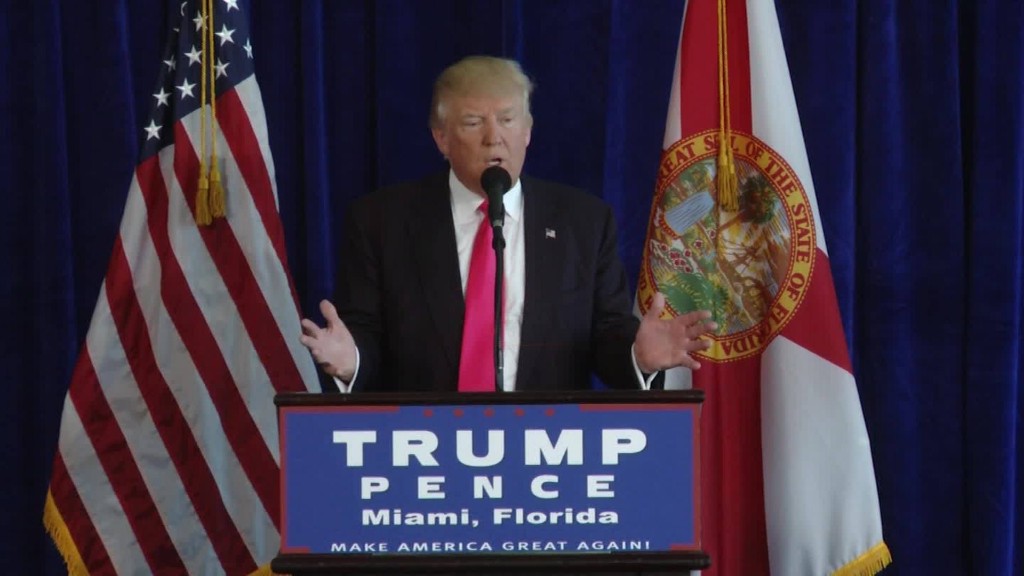
Donald Trump used to hate Wall Street. Not anymore.
On the campaign trail, he slammed Wall Street for "getting away with murder." He vowed to break up the big banks and force the finance guys to pay higher taxes. His final campaign ad showed ominous photos of the New York Stock Exchange and the CEO of Goldman Sachs and proclaimed it was time to put an end to the political and business elites that have "bled our country dry."
That message resonated deeply with voters who have watched Wall Street bonuses and stock prices come roaring back after the financial crisis while middle class wages have stagnated.
But President Trump has done a rapid U-turn on big banks in his first 100 days. He's embracing Wall Street now, not shunning it. He's stacked his cabinet with Wall Street types (especially from Goldman Sachs). And instead of talking about breaking up banks, he's focused on rolling back a lot of regulations on them.
"The Goldman Sachs faction in the White House has won," says Greg Valliere, chief global strategist at Horizon Investments. "This is starting to look like a fairly typical center-right administration, with a strong pro-business tilt."
Trump has danced away from the populism he campaigned on and into the arms Wall Street. It's arguably the greatest shift of the early days of his presidency, and it's having a substantial impact on economic policy.
Related: Trump's new problem: Americans aren't shopping
How Trump has pivoted toward Wall St.
Just look at his inner circle. Three of his top advisers -- Treasury Secretary Steve Mnuchin, chief economic adviser Gary Cohn and chief strategist Steve Bannon -- have worked at investment bank Goldman Sachs. (There are even more Goldman alums in the second rung of key positions).
On top of that, private equity king Stephen Schwarzman, who sits atop Blackstone Group, runs Trump's business advisory council and has emerged as a key voice in the president's ear.
The Wall Street influence is evident already in Trump's policy flip flops.
He's dialed back massively on the protectionist trade talk, especially on China. Trump campaigned on ripping up trade agreements like NAFTA and labeling China a currency manipulator (a fancy word for a cheater) on "Day One" in office. None of that happened.
Now he says China isn't so bad on trade, and his administration is studying how to tweak (not totally rip up) trade deals.
"What we've learned from Trump is his initial comments are outlandish, but they generally don't happen," says Randy Frederick, managing director of trading at Schwab.
He's even started saying nice things about Janet Yellen, the head of the Federal Reserve, whom he blasted on the campaign trail for rigging the economy to make Obama look better.
Related: Trump promises to help bankers 'petrified' of regulators
Trump is ready to help banks
Trump relishes praise, and investors have cheered his pro-Wall Street shift by sending the stock market to record highs. It's been dubbed the "Trump rally." The Dow and S&P 500 have jumped over 10% since he won the election, a fact the president likes to tout on Twitter and in his speeches (it's even mentioned on the White House website).
It's been easier to get a "win" in Wall Street's eyes than it has from Congress or presidential approval polls (Trump has the lowest approval rating at this stage of any modern president in US history).
"He is moderating because the wheels in Washington turn way slower than he wants, even with a big club," says Frederick.
Instead of bashing banks, Trump is now pushing hard to scale back the Dodd-Frank law that was put in place after the financial crisis to prevent bad behavior from financial firms.
He recently said he'll "do a big number" on the law. It's exactly what top Wall Street CEOs like JPMorgan's Jamie Dimon have been advocating for years. The fact that it's been a first 100-day priority is telling since it wasn't part of his "Contract with the American Voter" that he put out before the election.
Then there's the regulation -- known as the fiduciary rule -- that was supposed to take effect this spring to help protect middle class retirement accounts. The Trump administration has put it on hold, a major win for some Wall Street firms.
Related: Consumer confidence soars under Trump. Here's what it means
Watch what happens with taxes
Wall Street is getting what it wants on trade and regulation from Trump. There's just one big item outstanding: Taxes.
The White House is unveiling more details on Trump's tax reform plan Wednesday.
"This is going to be the biggest tax cut and the largest tax reform in our history," Treasury Secretary Mnuchin said Wednesday morning, although details are still being worked out.
Many GOP economists and business leaders are urging Trump to move quickly on cutting taxes for businesses, even if that means holding off on tax cuts for individuals and families.
The expectation is that Trump will push for the corporate tax rate to fall sharply from a top rate of 35% to just 15%.
It's a dramatic shift from Trump's rhetoric on the campaign trail when he told voters, "Wall Street has caused tremendous problems for us. We're going to tax Wall Street."
Bankers and investors appear to have strong advocates in the White House for their interests. It will be telling just how far the White House is willing to go on tax cuts for the middle class and small businesses.
As top adviser Cohn acknowledged last week, "The right lens to judge us against is: Do we grow the economy? Do we put more people to work? Do we get them better jobs?"


